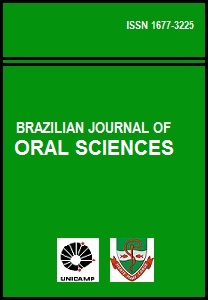Abstract
Aim: This in vitro study evaluated the effect of different aging periods and thermocycling on the adhesion of fiber posts to human dentin at different depths. Methods: Twenty teeth were cleaned, decoronated, and endodontically treated. After one week, root filling was removed and a 10-mm post space was prepared. Posts (RelyX™ Fiber size 2) were cemented with a self-adhesive resin cement (RelyX™ Unicem) and light cured. Specimens (n=4, each) were stored in 100% humidity (0 day, 7 days, 1 month, 3 months) or thermo-cycled (at 7 days, 10,000 cycles, 5-55C°, 30 s). Four 1-mm-thick sections were obtained from each tooth and a push-out test was performed and results compared. Results: There was a significant difference (ANOVA p<0.05) between the means of push-out test results (MPa ± SE) at different storage periods: 24 hours: 15.2 ± 1.4; 7 days: 16.8 ± 1.5; 1 month: 20.3 ± 1.8; and 3 months: 12.5±2.0. Shear strength was significantly different (Chi-square, p<0.05) at the different slice positions. Apical sections had an increase in strength at 7 days and 1 month, but without statistical significance. The coronal section increased significantly between 0 and 7 days. All sections had reduced strengths between 1 and 3 months, but only the apical sections decreased significantly (ANOVA, p<0.05). There was no significant difference in shear strength between thermally cycled and non-cycled samples (MPa/SE 16.7± 5.9, MPa/SE 16.0 ± 9.3)(p>0.05). Conclusions: Long-term storage of test samples affected the bond strength of fiber posts to radicular dentin variably, and should be considered as part of invitro testing.The Brazilian Journal of Oral Sciences uses the Creative Commons license (CC), thus preserving the integrity of the articles in an open access environment.
Downloads
Download data is not yet available.

